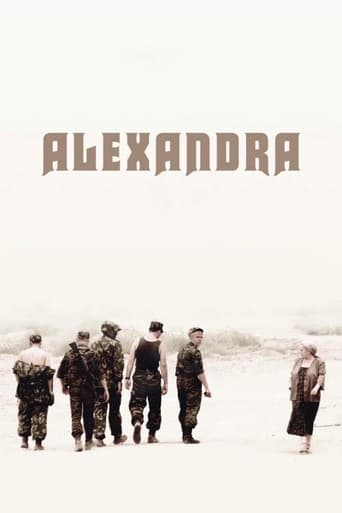

Aleksandr Sokurov's "Aleksandra" depicts an elderly woman visiting her grandson on a military base in Chechnya. We don't see where the title character comes from, but we get a feeling of how this is a new world to her. In that sense, one might interpret the movie as a look at how our tendency to stay in comfort zones blinds us to the rest of the world."Aleksandra" is one of those deliberately slow-moving films; it takes time to get to know the characters. The cast is not anyone likely to be recognizable to non-Russian audiences, but that doesn't matter. The point is that this movie is not a political statement about the situation in Chechnya, it's merely a look at this one woman's exposure to this new world within her own country. Not a masterpiece, but I found it to be a good movie. Intense, but worth seeing.
... View MoreGrandma Alexandra (Galina Vishnevskaya) looks very fed up. She's got the whole of Mother Russia on her back – so is needing to walk much Great Suffering out of her tired legs.She's gone to see Dennis (Dennis?!) her army officer grandson, where he's making war in the Chechen Republic. Whys she there? I mean, how credible is this? Why is she allowed to be there? Why is she allowed to wander around the front line faffing her fingers at the bored border guards? This situation seems like a contrived set-up of Sukurov's to facilely juxtapose women as nurturers against the bad boys (men) of war.It's soon turned into one of those films where questioning plot plausibility becomes irrelevant – cus there is no plot. Nothing very interesting happens. And nothing very interesting is said. She gets shown around the dusty hot base, the dirty combat vehicles. Now she's examining their shiny equipment. She's brusque, dismissive. Seen it all, done it all. "All" meaning all the suffering already. All the suffering these bored boys are too insensitive – or desensitized – to suffer, with all this impersonalised shooting off of these weapons of destruction they do.So she's wandering about the camp mumbling and muttering to herself like some grumpy old Mother Archetype. Its "Alexandra Nikolaevna" this and "Alexandra Nikolaevna" that (thought that only happened to characters in Tolstoy novels). Keeps needing to sit down cus tired. More than likely made tired; by the moral torpor shes witnessing – as accentuated by the drained out greeny gray the film is being filtered through."What do you actually want? I don't understand you" says Unit Commander. I don't understand her either. And its hard not to feel disengaged by all this gruff antipathy she's wearily trudging around the camp with. They can't help it – the poor lambs; they're just being soldiers. Making war and killing people is what soldiers do. Even if they are only little lads. If you don't like being there Gran – go away! And she's gone. Leaves as disgruntled/ crotchety/ lonely/dismayed(take your pick) as she came. Mind you, there's been a big granny love-in at the train departure; reinforcing how instantly, easily, connective womenfolk can be together. Because they – the grannies, (whether Russian or Chechen) represent humankind's best, possibly – only – hope against war (I doubt Sukurov meant anything as trite as that – but its as much thought as i want to give this film for now)
... View MoreI don't know many grandmothers that would take a troop train across Russia, then get on top a troop transport to visit their grandson (Vasily Shevtsov), an Army Captain in Chechnya. But this grandmother (Galina Vishnevskaya) did. It was certainly an arduous journey for the elderly woman.The films color is appropriate for the hot and dirty climate where here grandson is stationed. The soldiers are all shirtless and just sit around waiting. The other soldiers watch her with fascination, probably thinking of home and their own grandmothers.She makes her way to the market where cigarettes are priced depending upon you rank. The locals look at the Russians with disgust. She manages to connect with a local, Malika (Raisa Gichaeva), who treats her like a sister.It is not a place for a grandmother, but she manages to connect again with her grandson before he goes off on a five-days mission, and she boards the troop train home.It was only anti-war in a subtle sense. The futility of it all was visible, but not exaggerated. Maybe the futility was finally recognized as the Russians are to leave Chechnya soon.A very good story.
... View MoreAleksandra is the movie that Putin disliked and Chechen banned. It's a movie about temperamental old lady who travels from Russia to Chechen to see her grandson in military base. The movie combines greatly aging and military. Story about a woman who doesn't want to get old while the others spend their aging time killing. There isn't any set decorations used, all is authentic. The military base, ruins, soldiers and the common people. Aleksandra is a great movie from one of Russians most interesting film-maker at the moment. If you aren't scared of slow and lifelike drama. This is very easy to recommend. It is humane, it is insightful.
... View More